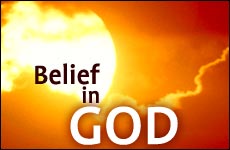 You Know More Hebrew Words Than You Think
You Know More Hebrew Words Than You Think


10 min read
Strengthening one's intellectual understanding and emotional connection to the Divine.
An excerpt from Rabbi Kaplan's Handbook of Jewish Thought.
Faith in God is the foundation of Judaism... Faith is not just the utterance of words, however, but a firm belief and conviction with one's mind and heart. It is also a commitment to be acted upon, with an earnest adherence to the course prescribed by God. It is for this reason that belief alone without obedience to God is an absurdity...
Our faith begins with the traditions which have been transmitted to us by our ancestors and in our sacred literature. Through these we know of God, His works and His teachings. The Torah thus tells us, "Ask your father and he will tell you, your grandfather and he will inform you" (Deut. 32:7). It also declares [in the Shema], "Hear O Israel, the Lord our God, the Lord is One" (Deut. 6:4), which implies that one is to accept these truths on the basis of hearing and understanding them.
The final goal is knowledge rather than mere tradition.
There are some who maintain that this is only a first step, whereas the highest level of faith comes from the philosophical proof of these truths. According to this opinion, one who has the ability is required to attempt to prove the foundations of our faith. This is alluded to in such passages as "Know that God is the Lord, He made us and we are His" (Psalms 100:3), which indicate that the final goal is knowledge rather than mere tradition.
There are others, however, who maintain that the highest faith is that derived through tradition alone, in which case metaphysical proof should only be used as a last resort to preclude disbelief. According to this opinion, a well reasoned faith and a deep knowledge of God can be obtained from tradition alone.
In the final analysis, one should strive to learn the foundations of our faith and acquire a deep understanding of them, since belief based upon mere habit and blind tradition is a weak faith which can be assailed by doubts and overthrown by arguments.
A strong faith is therefore based upon both reason and tradition, as the prophet taught, "Do you not know? Have you not heard? Was it not told to you from the beginning? Do you not understand how the earth was founded? (Isaiah 40:21). Similarly, we are taught, "Know the God of your father" (I Chronicles 29:9). In each case, one is commanded to know and understand rationally that which has been taught and received by tradition.
If one has the ability, he should use his knowledge to add to what has been derived from tradition. Thus, we read, "This is my God and I will glorify Him, my father's God and I will exalt Him" (Exodus 15:2), which indicates that He is my God through my own understanding, at the same time that He is my father's God through tradition. We similarly pray, "Our God and God of our fathers," and Jews are called "believers, sons of believers."
Questions and Doubts
If one is able, he should learn enough science to be able to recognize the world as the work of God and comprehend His greatness, as the prophet declares, "Lift up your eyes to the stars and see Who has created them" (Isaiah 40:26). If one is a scholar, he should do this when he cannot otherwise engage in religious studies.
At the same time, one should avoid useless metaphysical speculation as well as the study of philosophy in general, since they tend to undermine one's faith. If one is in a position where he must engage in such studies, he may do so, but with the utmost caution.
The path to true faith is through the observance and study of our religious teachings. Even if one feels that his faith is weak, he should continue his observances and studies and they will bring him back to God. We are taught that God said, "If they would have abandoned Me but kept My Torah, its inherent light would have brought them back to Me."
Conversely, if one does not study our religious teachings, he may find himself not observing the commandments. This will lead him to look down upon those who do observe, and even hate our religious teachers. He may then try to prevent others from observing, for he will have found a way to deny the divine origin Himself. The Torah warns about this type of progression when it says, "[But this is what will happen] if you do not listen to Me, and do not keep all these commandments: You will come to denigrate My decrees and grow tired of My laws. You will not keep all My commandments and you will end up nullifying My covenant" (Leviticus 26:15).
If one is confronted by questions and doubts concerning our religious fundamentals, he should have faith that these questions are answerable. There is nothing that can stand before absolute faith, as the prophet taught us, "The righteous lives by his faith" (Habakkuk 2:4).
If one feels that his faith is wavering, he should carefully weigh the possible loss that disbelief will entail against whatever profit it will bring.
One should trust one's own belief, and not doubt his own motives.
Highest Level of Faith
Some nonbelievers try to explain away our belief psychologically. However, the same argument can be used regarding their disbelief. Furthermore, there is considerable objective evidence for the truth of our religion.
There are many teachings in our religion that are known only from tradition and cannot be proven at all. There is a limit beyond which rational proof fails and breaks down, and this is where we must rely upon faith and tradition.
The Torah does not oblige us to believe absurdities.
Nevertheless, the Torah does not oblige us to believe absurdities, and one should carefully examine the sources of farfetched common beliefs to determine whether they actually have a basis in tradition. Regarding this it is written, "The fool believes everything, but the prudent man will follow the right path" (Proverbs 14:15).
Therefore, one must carefully study and trust the words and writings of our prophets and sages. Belief in our great religious leaders, who are the shepherds of our faith, is equated with belief in God Himself. We are thus taught, "Believing in the faithful shepherd is like believing in the One Who spoke and brought the universe into existence." Similarly, it is written, "Believe in God and you will be established; believe in His prophets and you will prosper" (2 Chronicles 20:20).
The highest level of faith, which is attained only by individuals such as our prophets and holy men, is the transcendence of their very physical nature until they actually experience the Divine, and can say "this is my God" (Exodus 15:2). Once a person has experienced this, there can never be a doubt in his mind, as he has surpassed mere faith and belief and has attained the unambiguous cognizance of God. To one who has never experienced this, it is as unimaginable as color is to the blind.
Answering the Nonbeliever
Belief in God and our religious fundamentals is our most precious possession and must be guarded accordingly. The Bible recognizes the atheist and calls him a fool, as it is written, "The fool says in his heart, there is no God" (Psalms 14:1).
We are therefore commanded not to let atheistic thoughts or material desires undermine our faith, as the Torah declares, "Do not stray after your heart or after your eyes" (Numbers 15:39).
This is a negative commandment, depending upon thought, and can be observed at any time by asserting one's will and refusing to be led astray from our faith...
One should be familiar enough with the basics of our religion and its rational arguments in order to know how to answer the nonbeliever. However... one should therefore only engage in a religious debate when it is initiated by the nonbeliever and there is danger that he might influence others, and even in such a case one should not debate unless he is thoroughly familiar with the question and skillful in debate. If one has confidence that he can prevail, he may debate, as we are taught, "Answer a fool according to his folly, lest he be wise in his own eyes" (Proverbs 26:5).
Relying on Miracles
Faith and trust in God are partners, since one who believes in an omniscient, omnipotent and benevolent God must also believe that He will provide for His faithful. Therefore, one should trust in God and not be overly concerned about the future. It is thus written, "Commit your way to God. Trust in Him and He will do [for you]" (Psalms 37:5), and "Blessed is the man who trusts in God; God will be his trust" (Jeremiah 17:7).
Therefore, one should not seek to ascertain the future by fortune telling, astrology or other superstitions. Concerning this, The Torah commands us, "You must remain totally faithful to God your Lord" (Deut. 18:13), which some authorities count as a positive commandment.
Trusting in God does not mean that one should neglect to make any future plans, nor does it mean that one should sit back and depend upon God to miraculously feed him or neglect one's health and expect God to keep him sound. Regarding these it is written, "A man's foolishness perverts his way; in his heart he ends up blaming [his misfortunes on] God" (Proverbs 19:3).
One should certainly not place himself in danger and then rely upon a miracle to save him.
Even in situations where miracles were likely to occur, our sages would not depend upon them, and even refused to benefit from them.
We should not test God by demanding immediate reward for our good deeds.
If one is engaged in a good deed, he may trust in God and ignore a possible danger. Still, if danger is likely, he is required to take heed.
We are commanded not to test God by asking for a miracle or demanding an immediate reward for our good deeds, as it is written, "Do not test God your Lord" (Deut. 6:16).
The only exception to this is the commandment of charity, regarding which God says, "Bring all the tithes… and with this put Me to the test, says the God of Hosts, to see if I open for you the windows of heaven, and pour out for you an overflowing blessing" (Malachi 3:10).
Some maintain that one may ask God for a sign to help him make a difficult decision if there is no other logical means available, but this should only be used as a last resort...
Very great is the reward of faith. We thus find that our ancestors were redeemed from Egypt because of their faith and trust in God.
From "The Handbook of Jewish Thought" (Vol. 2, Maznaim Publishing. Reprinted with permission.
